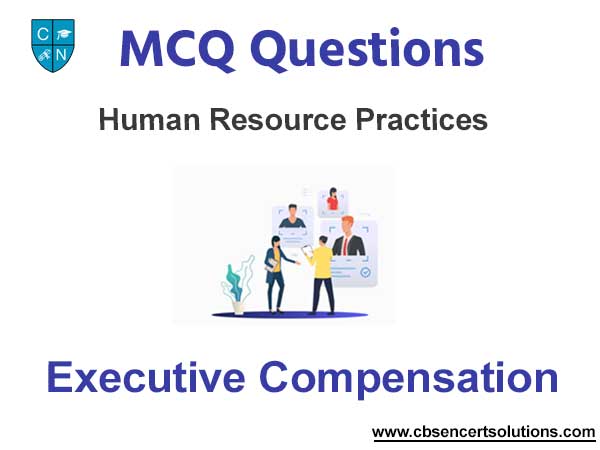Please refer to Executive Compensation MCQ Questions with Answers provided below. These multiple-choice questions with solutions are really important if you are preparing for Human Resource Practice examination. We have provided these objective questions based on the latest syllabus and examination guidelines for the current academic year. We have also provided MCQ Questions for Human Resource Practices for all chapters on our website.
MCQ Questions with Answers Executive Compensation
You can test your understanding by going through the Executive Compensation MCQ Questions with Answers provided below. All the latest questions have been provided by our expert teachers for you to download in Pdf.
Question. The actual achievements compared with the objectives of the job is
(a) Job Performance
(b) Job evaluation
(c) Job description
(d) None of these
Answer
A
Question. The following is (are) concerned with developing a pool of candidates in line with the human resources plan.
(a) Development
(b) Training
(c) Recruitment
(d) All of these
Answer
C
Question. Which of the following is a benefit of employee training?
(a) Improves morale
(b) Helps people identify with organisational goals
(c) Provides a good climate for learning, growth and co – ordination
(d) None of these
Answer
B
Question. Movement of an employee from one job to another.
(a) Job Enlargement
(b) Retrenchment
(c) Job Rotation
(d) Job Design
Answer
C
Question. _____________ can be promoted for the top level job.
(a) Potential employees
(b) Legal employees
(c) Skilled employees
(d) Trained employees
Answer
A
Question. Performance development plan is set for the employee by his immediate boss.
(a) Employer
(b) Department Head
(c) Immediate boss
(d) None of these
Answer
C
Question. Performance appraisal refers to ______________ of an employee.
(a) Training.
(b) Placement.
(c) Assessment.
(d) Induction
Answer
C
Question. What is Harmonious relationship at workplace?
(a) Friendly in nature
(b) Pleasing and consistent
(c) Cordial and available
(d) All the above
Answer
D
Question. Rotation is otherwise called as ______________.
(a) replacement transfer
(b) shift transfer
(c) versatility transfer
(d) remedial transfer
Answer
C
Question. No attendance monitoring is pertinent to
(a) career appraisal
(b) Performance appraisal
(c) Compensation and benefits
(d) Selection of the employee
Answer
C
Question. Training increases the employees
(a) market value
(b) earning power
(c) job security
(d) All of these
Answer
B
Question. How does training and development offer competitive advantage to an organisation?
(a) Removing performance decencies
(b) Individuals have the aptitude and motivation to learn
(c) Deficiency is caused by a lack of ability
(d) None of these
Answer
A
Question. Which of the forecasting technique is the fastest?
(a) Work study technique
(b) Flow models
(c) Ratio trend analysis
(d) HR demand Forecast
Answer
C
Question. Which of these is an off – the – job training method?
(a) Television
(b) Job rotation
(c) Orientation training
(d) Coaching
Answer
C
Question. The test which compare employee performance with job requirements ______________.
(a) Selection test
(b) Preference test
(c) Achievement test
(d) Simulation
Answer
B
Question. ______________ is a performance measure of both efficiency and effectiveness.
(a) Organisational behaviour
(b) Organisational citizenship
(c) Employee productivity
(d) None of these
Answer
C
Question. Sources of recruitment & methods, procedures, techniques for ______________.
(a) Selection.
(b) Promotion.
(c) Transfer.
(d) Training.
Answer
A
Question. Which performance appraisal methods consumes a lot of time?
(a) Essay method
(b) Rating Scales
(c) Critical incident
(d) Tests And Observation
Answer
B
Question. ______________ refers to the learning opportunities designed to help employees grow.
(a) Training
(b) Development
(c) Education
(d) All of these
Answer
D
Question. Employee training requires to meet
(a) Job requirement
(b) Job enhancement
(c) Job Analysis
(d) Job Enrichment
Answer
A
Question. Which of these is a hindrance to effective training?
(a) Career planning workshop
(b) Aggregate spending on training is inadequate
(c) Mentoring
(d) Career counselling
Answer
B
Question. The focuses of psychological appraisals are on ______________.
(a) Future potential
(b) Actual performance
(c) Past performance
(d) None of these
Answer
A
Question. Which of the following is a barrier while doing human resource planning?
(a) HR information often is incompatible with the information used in strategy formulation
(b) Implementing human resource information system
(c) Managing inventories
(d) Supply forecast
Answer
A
Question. Performance appraisals are designed to motivate workers by providing them with feedback, recognition, and what?
(a) Better work facilities
(b) Equal opportunities
(c) Greater work autonomy
(d) Praise
Answer
D
Question. When appraisals are made by superiors, peers, subordinates and clients then it is called ______________.
(a) 360 degree feedback
(b) 180 degree feedback
(c) Self – appraisal
(d) All of these
Answer
A
Question. What are the pre – requisites for successful human resource planning?
(a) Backing of top management
(b) Personal records must be complete
(c) Techniques of planning should be the best
(d) All of these
Answer
D
Question. The process of providing the trainees the information about their performance.
(a) Feedback
(b) Observation
(c) Suggestion
(d) Research
Answer
A
Question. Picking up suitable candidates by rejecting the unsuitable ______________.
(a) Recruitment
(b) Training
(c) Selection
(d) Development
Answer
C
Question. What techniques are used while analysing the internal supply?
(a) Inflows and outflows
(b) Turnover rate
(c) Conditions of work and absenteeism
(d) All of these
Answer
D
Question. Sending employees for higher studies.
(a) Process of appraisal
(b) Process of selection
(c) Motivation
(d) Learning and development
Answer
D
Question. Employees can be appraisal against ______________.
(a) Relative standards
(b) Objective
(c) Absolute standards
(d) Group
Answer
A
Question. Job evaluation is based on the:
(a) Complexity of the job to perform
(b) Conceptual skill required by the job
(c) Relative job worth for an organization
(d) Physical skills required by the job
Answer
A
Question. Which of these is one of the seven criteria for assessing performance?
(a) Community service
(b) Interpersonal contact
(c) Need for supervision
(d) All of these
Answer
D
Question. A kind of future oriented training ______________.
(a) Employee training
(b) Employee development
(c) Employability
(d) Employee potential
Answer
B
Question. ______________ seeks to examine the goals of the organisation and the trends that are likely to affect these goals.
(a) Organisational Support
(b) Organisational analysis
(c) Person analysis
(d) Key skill abilities analysis
Answer
D
Question. Dispute between employees at different levels in an organization is known as ______________.
(a) Horizontal conflict
(b) Over all conflict.
(c) Vertical conflict
(d) Organizational conflict.
Answer
C
Question. Which of the following is a method used in group or organisational training needs assessment?
(a) Consideration of current and projected changes
(b) Rating scales
(c) Interviews
(d) Questionnaires
Answer
D
Question. Which of the following helps the employee to improve their efficiency?
(a) Development
(b) Training.
(c) Promotion.
(d) Transfer.
Answer
B
Question. Why are employers interested in employee engagement?
(a) To encourage employees to trust their manager.
(b) To make a quick profit
(c) To make employees work harder for less
(d) Because engaged employees are more motivated and prepared to give their best to make the firm succeed.
Answer
D
Question. Which of the below given options is a pre – requisite for an effective incentive system?
(a) Increased need for planning
(b) Co-operation of workers
(c) Management’s commitment to the cost and time necessary to administer incentive schemes
(d) All of the these
Answer
D



